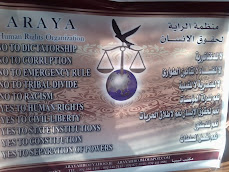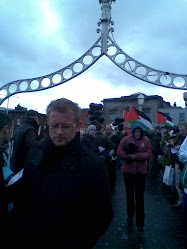Do please ensure that you coordinate all mental health work in Misratah with Dr Ahmed.
aziz
On Wed, Aug 10, 2011 at 5:23 PM, ahmed sewehli
Asalaam aleykum
I have returned from Misrata to the UK for a couple of weeks following 6 weeks there working as a psychiatrist. I did over 120 consultations (documented), 2 radio programmes (with psychologists and imams), plus informal group therapy with surgeons and physicians, as well as training in diagnosis and management for doctors and psychologists. During that time I officially set up the Misrata Psychiatry Team with the approval of the Misrata Medical Committee and Misrata Transitional Council.. Dr Nagi Barakat is also aware of this team. I , along with my colleague, will be training at least 2 junior doctors with an interest in psychiatry, at least one of whom will be female. There is already a junior female psychiatrist preparing to join us from Benghazi- she visited Misrata and I found her to be a very good doctor who is willing to help and learn. We have 2 pharmacists on the team, one with a special interest in psychotropic medication. I am still liaising with colleague managers and doctors to get a more permanent place as an OPD/headquarters for our team (it is not a question of just getting a building-many people have offered their private premises, but there are a number of factors which the team are considering). We are not considering inpatient department at this time due to the small number of psychiatrists and NO psychiatric nurses. This of course is very difficult as I have seen a number of patients who definitely needed admission but had to be managed by their families at home with intensive follow-up.
In terms of women, I saw many patients with depression and PTSD, as well as those who already had chronic illnesses mainly schizophrenia and bipolar disorder. I saw just one rape victim. I am sure there are more (but unsure of how many more). I have visited the senior gynaecologists of Misrata to discuss this, and to offer my services should the need arise. I have also discussed this issue with MSF, who have a stereotypical Western view about this issue (including insisting as in their protocol that I offered the victim a document stating that she had been raped in case she wished to go to court or claim financial compensation in future), although on meeting further with their psychologists and head of mission they seem to now understand the culture of Libya in general and Misrata in particular. As we were taught whilst training in psychiatry in the UK, psychiatry differs in different parts of the world according to the culture and environment.
Now, there are many independent social groups, women's groups, cultural groups in Misrata, all putting in a lot of effort in their own ways to 'find and support the rape victims'. Some may be doing a good job, others may not. What I do believe is that there are too many of these well-intentioned people, indeed they may be more than the number of cases. Allahu A3lam.
Since going to Misrata I have been approached by many international TV and newspaper journalists on the rape issue. I have declined all interviews related to this for the following reasons: 1) the whole world already knows about this and Gaddafi's crimes, I dont see how shouting louder would make any difference. 2) This will not encourage cases to come forward, and may indeed keep people away if you are going to be linked to just treating rape.
Dr Seham Sergewa (clinical psychologist who appeared on CNN and alJazeera) visited Misrata for a seminar 2 days before I left. She stayed in the journalists hotel which she did not want to leave(according to her psychologist colleague) as she was concerned for her safety (there was no obvious reason for this). Note that she came with her husband. She was accompanied to this seminar by a Misrata freedom fighter with a machine-gun at her request. In my six weeks in Misrata I have not seen one person being escorted like that, and no one is carrying a machine gun unless they are fighters (not even my father who is in Misrata and is wanted by Gaddafi after escaping prison).
During her seminar, which was attended by about 60-80 people, she stated the percentage of rape complaints in Europe and the Usa to be up to 25%. She also stated the number of rape cases in Rwanda and Bosnia. Then said that there were 1300 estimated cases in Libya.
Then she said that this uprising was done by Libyan men without asking the women (??). Then she said that Libyans do not respect women who do not wear hijab (??). Then, after going into explicit sexual detail about what rape was (I was the only person who kept kicking the children out who should not have been there for such an issue anyway), wait for this, she said: Rape victims who are not treated will either commit suicide or become prostitutes! ......(she used the word 'da3ara')
After 2 other people spoke I got my turn. I had been keeping notes, which I still have. I critically appraised her lecture, including the fact that the number of rape complaints in the West was not applicable to Libya (for obvious reasons). Also that the numbers for Bosnia and Rwanda (where cannibalism was practised) was not applicable. Yes, there was rape in this war, and yes Gaddafi had committed these atrocities. I said that in Misrata rape victims would not become prostitutes. I finally said that any practical help would be welcome.When I finished she first said, in English: 'do not teach me!', then continued in A rabic to say how she was a professor and had a PhD from London, etc, etc, then she said: 'yes, dr, even in Misrata they can become prostitutes' . People around me were saying la hawla walla kuwata illa billah......
By the way her husband came out when the 'seminar' ended and said how dare I criticise her and that he himself was FRCS and that I had a 'closed mind'.I replied that I was criticising her presentation and not his wife, as we have been taught in training.
Anyway, this was just to give you an idea about things. My opinion is that I wish that all this effort is focused on all women in Misrata, and especially those suffering from PTSD, depression, anxiety, rather than just rape victims who cannot be found. One lady I saw was suffering from severe PTSD following the death of her husband in her arms after a Grad missile attack, and another lady was shot at with her children (yet all survived) and could not function anymore. Are they not important? There isnt even a psychiatric department in Misrata, which is the most basic essential need, yet hundreds of people locally and abroad are focusing, for some reason or other, on rape only. If we focus on all women, that will inshallah include all kinds of victims.
Just to end on a high note, Misrata is doing much much better than what I thought before I went, and the morale of the people is, mashallah, amazing. Everyone is doing what they can in order for the city to run effectively (including militarily), and people are very much together.
Inshallah I will be returning to Misrata within the next few days.
Ramadan Kareem Wa Salaam Aleykum
Ahmed
Dr Ahmed Sewehli
Head, Misrata Psychiatry Team
Misrata, Libya




































































No comments:
Post a Comment